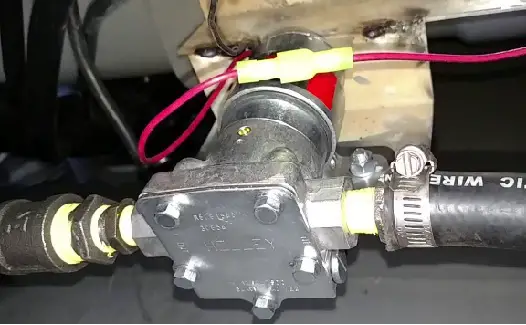If you are running a vehicle with Holley inline electric fuel pump, then you might have come across the issue of loud noise.
This noise issue typically depends on the type of car and the noise generated by the engine and the exhaust system.
If the Holley fuel pump noise is over the exhaust noise, then you may perceive it as noisy and that would irritate you.
Also if you are running a car that produces 1500 horsepower and the amount of fuel required to produce that power depends on the fuel flow rate delivered by the Holley fuel pump. Hence the fuel pump would work harder and thereby end up generating huge noise and you may not consider that noise since you would accept the work required to be done by the fuel pump.
Apart from that there are other probable reasons which would make the Holley fuel pump to work harder and make loud buzzing noise.
The main reasons why the Holley fuel pump is so loud and noisy would be a blocked fuel filter, incorrect fuel filter, wrong filter orientation, no rubber mounting isolators, improper fuel pump ventilation, rigid fuel lines, incorrect fuel pump location, damaged fuel pump, clogged fuel pressure regulator, blocked fuel strainer, Kinked fuel hose, Incorrect tank venting, low gas, and contaminated Fuel.
If you are wondering why the Holley fuel pump is so loud and noisy, then you are not alone. Here, you will get answers to your doubts. Stay tuned!
Table Of Contents
- 1 Why Holley Fuel Pump Is So Loud And Noisy? 14 Causes And Solutions To Fix It!
- 1.1 No Rubber mounting isolators
- 1.2 Blocked fuel filter
- 1.3 Incorrect fuel filter
- 1.4 Wrong filter orientation
- 1.5 Improper fuel pump ventilation
- 1.6 Rigid fuel lines
- 1.7 Incorrect fuel pump location
- 1.8 Damaged fuel pump
- 1.9 Clogged fuel pressure regulator
- 1.10 Blocked fuel strainer
- 1.11 Kinked fuel hose
- 1.12 Incorrect tank venting
- 1.13 Low Gas
- 1.14 Contaminated Fuel
- 2 Final Thoughts
Why Holley Fuel Pump Is So Loud And Noisy? 14 Causes And Solutions To Fix It!
Since the inline electric Holley fuel pump is outside the fuel tank and not surrounded by the fuel, there is no medium to dampen the noise generated by the fuel pump and anybody would feel like it is noisy.
Moreover, the inline fuel pumps are not cooled by the fuel hence after overheating the fuel pump starts producing noise.
Below are the few causes that make your Holley fuel pump work louder and solutions to fix it.
No Rubber mounting isolators
Typically, the Holley fuel pumps are recommended to be mounted on the vehicle along with rubber mounting pads or bushes.
This rubber mounting arrangement help in isolating the vibration produced by the fuel pump while operating and dampening it.
But it is worthwhile to remember that do not tighten the rubber mounting too much.
Otherwise, the rubber will be fully compressed and there won’t be any juice left to dampen the vibration and it would then acts like a metal mounting.
On the other hand, if the fuel pump is loosely mounted then also the fuel pump would resonate while driving and the Holley fuel pump would be making a loud sound.
So inspect the fuel pump mountings and tighten them optimally, neither too tight nor too loose.
Blocked fuel filter
When did you replace the fuel filter? If it’s been a long time, then it is time to replace it.
The fuel filter gets clogged over a period of running and that would put a load on the fuel pump as it exerts pressure drop and restricts the fuel flow.
Hence your Holley fuel pump while working harder to maintain the pressure and fuel flow rate, would end up producing loud whining or buzzing noise.
Whenever you are replacing the fuel pump, it is recommended to replace the fuel filter as well.
Incorrect fuel filter
Using the correct filter aperture size is essential to ensure that you are not unnecessarily loading the fuel pump.
Are you using a fine fuel prefilter like 10-20 microns before the pump? Then that would result in fuel pump cavitation and the Holley fuel pump would make loud whining noise while running.
It is recommended to use a 100-micron pre-filter to capture the coarse foreign dust particles.
The fuel pump would withstand 100-micron dust particles with ease without making noise but not by the fuel injectors of the EFI system.
Hence it is essential to use a 10-micron post filter as the fuel injectors won’t tolerate particles higher than 10 microns in size.
In the case of the carburetor system, you may use a 40-micron post filter as the carburetor system unlike the FI system is not that much sensitive to dust size.
Wrong filter orientation
The fuel filter typically allows fuel to flow freely in one direction and would create a large pressure drop if the fuel flows in the reverse direction.
But if the orientation of the fuel filter is wrong and fitted in the reverse direction, then the fuel filter would exert load on the fuel pump thereby making it work harder which eventually leads to loud whining noise from the Holley fuel pump.
Improper fuel pump ventilation
In addition to rubber mounting, it is recommended to space up the fuel pump for proper fuel pump ventilation so that sufficient space will be available to avoid heat trap
An overheated fuel pump would make noise, hence ensure that the fuel pump is naturally cooled.
Rigid fuel lines
If you are using stainless steel metal fuel lines running from the fuel tank to the engine, then the pump’s harmonic vibration produced by the fuel pump would be reverberated and amplified all along the vehicle length and you would experience that the Holley fuel pump is running loud.
Wherever possible replace the stainless steel fuel lines with nylon braided hoses or rubber hoses that would dampen the vibration noise produced by the fuel pump.
It is worthwhile to use at least 3 feet of braided flex hose from the pump to the metal line connection and also from the tank to the filter to the pump inlet.
Incorrect fuel pump location
The Holley fuel pumps are typically good at pushing rather than pulling, hence it is necessary to have minimum restriction on the pulling side.
Hence the fuel pump shall be mounted at a level lower than the bottom of the fuel tank to ensure gravity feed to the fuel pump so that the fuel pump would work with ease.
Also, the Holley fuel pump shall be located closer to the fuel tank, so that the length of the fuel line from the tank to the fuel pump shall be shorter so that there would be minimum pressure drop while pulling the fuel from the tank.
Shorter fuel lines will make the fuel pump work quieter, so keep it as short and big as possible.
If the fuel pump is located at a level higher than the fuel tank bottom and away from it, then the Holley fuel pump would make loud buzzing noise while pulling fuel from the fuel tank.
Damaged fuel pump
If the Holley fuel pump is going bad, then also it would make a loud buzzing noise and you may also experience vehicle-related issues like engine misfire, loss of power and acceleration, engine stalling, and a decrease in fuel efficiency.
Ensure that the Holley fuel pump is running fine by checking the fuel pressure at the fuel pump outlet. If the pressure is less, then it indicates that the fuel pump is damaged and needs to be replaced with a new one.
Clogged fuel pressure regulator
Similar to the fuel filter, the fuel pressure regulator when it gets clogged would put undue load on the fuel pump.
Your Holley fuel pump shall work harder to overcome the pressure drop offered by the fuel pressure regulator and thereby makes a loud buzzing or whining noise.
And the situation would be aggravated if you are not using a return-style fuel system. A non-returnable fuel system would add to the load on the fuel pump.
Inspect the fuel pressure regulator and replace it if required with a new one.
Blocked fuel strainer
Similar to the fuel filter, the fuel strainer which sits inside the fuel tank has to be clear of clogging.
Otherwise, it would create a pressure drop on the suction side that would make the pump run harder and leads to fuel pump cavitation and loud noise.
Kinked fuel hose
Have you checked that the fuel hoses which is getting connected to the fuel pump are free from kinks and blockage? A kinked fuel hose would restrict the fuel flow and put a load on the Holley inline electric fuel pump.
Ensure that the fuel hoses are connecting straight to the engine without any kinks to make your Holley fuel pump run quieter.
Incorrect tank venting
The fuel tank venting plays an important role in maintaining atmospheric pressure inside the fuel tank.
The venting could be through the fuel cap, canister, or any other check valve connected to the fuel tank.
If the tank venting is not proper due to blockage at the venting point, then a vacuum will be generated inside the fuel tank and that would put a load on the fuel pump thereby making it work louder than usual.
Low Gas
It is obvious that if you are running low on gas, then it would stress no the fuel pump while sucking fuel from the fuel tank. Riding with “E” on your dash will make your fuel pump produce a loud whining noise.
It is always prudent to refill your fuel tank before the fuel indicator needle reaches an empty level.
Contaminated Fuel
Are you refilling your fuel tank from roadside vendors with cans, then it is possible that the fuel is contaminated.
The contaminated fuel causes clogging of the fuel strainer, fuel filter, fuel pressure regulator, and fuel pump itself and that would put undue load on the Holley fuel pump hence it would make that loud buzzing or grinding noise.
You may also experience hard starting, engine misfire, and stalling issues. It is recommended to clean the fuel tank if you are suspecting fuel contamination is the cause of loud fuel pump noise.
Final Thoughts
Any components which exert stress and load on the Holley fuel pump would make it work harder and make it run louder.
It is essential to work on parts that are connected to Holley fuel pumps and ensure that they are not malfunctioning or going bad. Inspect the parts and replace them if required.
The Holley fuel pumps are a vane type fuel pump that typically works louder than the turbine type of in-tank fuel pump due to mechanical contact inside and hence make the buzzing, grinding, or whining noise.
It is recommended to use any other mechanical or in-tank fuel pumps to get rid of the loud noise or may try using carter, Mallory, or Aeromotive inline electric fuel pumps which are said to be quieter.
If your current fuel tank doesn’t allow packaging an in-tank fuel pump, then you may go for a new fuel tank that can accommodate the in-tank fuel pump, since the in-tank fuel pumps typically work quieter than inline electric fuel pumps.
Happy Motoring!
References
https://forums.holley.com/forum/holley-efi/sniper-efi/33394-loud-fuel-pump
https://www.vintage-mustang.com/threads/my-holley-fuel-pump-is-loud.628908/
https://www.thirdgen.org/forums/electronics/109371-holley-blue-fuel-pump.html
Related Articles
Fuel Filter Before or After Pump? Which One Is Correct?
Fuel Pump Vs Fuel Filter? How to Identify Problems?
Fuel Pump Not Priming? Reasons And Solutions To Fix It!
Fuel Pump Runs Continuously With Key On? (9 Causes And Solutions To Fix It!)
Fuel Pump Primes But No Pressure. Everything You Need To Know!

